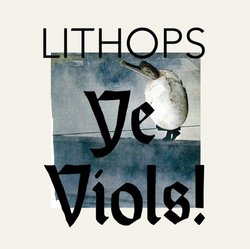Ye Viols!
Mike Newmark | Tarzana, CA United States | 02/05/2009
(3 out of 5 stars)
"Two albums were released in 2006 by Lithops, the solo project of Mouse on Mars' Jan St. Werner. The first was Queries in June, a collection of singles and unreleased tracks recorded between 1995 and 1999, which referenced the bubbly, bouncy dub-tronica that dominated the Mouse on Mars oeuvre during that period. Then came the proper full-length Mound Magnet in November, and the differences couldn't have been starker: loud and ungraspable chunks of noise and melody hurled at the listener, not unlike the crash of metal that was Mouse on Mars' Varcharz (also released that year). Taken together, Queries and Mound Magnet provided a keen look at Lithops' path from "then" to "now", one that caused most of those who cared to lament the passing of his ingratiating aesthetic in favor of a more abrasive one. The turning point and missing segment of the trajectory was his 2003 album Scrypt, an inconsiderate barrage of punishing noise punctuated by the occasional breather. Despite St. Werner's saltatory tendencies, Scrypt`s seriousness carried an air of stubborn finality, as if to say, "Yep, I think I'll stick around for a good, long while." And that's basically what happened.
Nothing St. Werner touches has ever been less than technically proficient, but with each new album it's becoming increasingly difficult for Lithops to shake its reputation as a poor man's Mouse on Mars, a trend that dates all the way back to its early singles and continues here, on the intelligently constructed, fundamentally flawed Ye Viols! Sounding even more like Mound Magnet than Mound Magnet 2 (2008) and ripping old pages out of Scrypt`s playbook, Ye Viols! is mired in the kind of motherboard-clogging gunk that electronic musicians sometimes use to make the listening experience more arduous. It does find Lithops inching ever closer to tunefulness, though it never truly arrives there. "Graf" opens auspiciously, with some quavering notes and a funky, propulsive beat, but it quickly becomes clear that St. Werner doesn't have melody in mind; soon, he's treating the tuneful elements as he would a blast of noise or a floating piece of digital waste. By contrast, "Handed" is all melody, where clusters of sharp synths bounce up and down, change chords, melt into soup, and pick themselves up again to resume the motion. There's no real song in it, but the image it brings to mind--tots at a sleepover party all jumping on the bed before getting tuckered out and falling on the floor--is still pretty cute.
"Sebquenz", easily the most traditional "tune" of the bunch, highlights both the strengths and the pitfalls of Lithops' melodic approach. I'll eat my weight in chickpeas if the title isn't a winking reference to Mouse on Mars' "Subsequence" (though I might have titled it "Oops" or "Grandpa Tries and Fails to Disco-Dance with a Rubber Chicken as a Partner"), and like that track, it draws most of its energy from the Power of Silliness. Its constituent parts have been deliberately tweaked to sound as awkward as possible, like a defective cymbal monkey hobbling hilariously across the playroom. I have to at least fight back laughter every time I hear it, but considering what he and Andi Toma have done with melody in their parent project, I can't help but suspect that St. Werner aimed low. Turning silliness into smart, serious business is no easy task, but it's one that Mouse on Mars have been able to execute better than just about anyone, essentially because they have an ear for the things that move us--whether it's our feet, our emotions, our behinds, or the corners of our lips. When Lithops moves me only to hysterics, it can leave me somewhat wanting.
For better or for worse, "Sebquenz" says bye-bye to melody and the rest of the disc delves into an obliterative digital wash. It's easy for some of the more appealing moments to become lost in such an unforgiving climate. "Apps 2" creates a blood rush with its fast-forwarded spy music over a "pitta-pitta-pitta" beat like BBs hitting a padded wall, but you may need to slog through "21. Jhrdt", "In Nitro" and "Apps 1"--superficially akin to "Apps 2" but which amount to a lot of nothing--in order to find it. The three-song run that follows "Apps 2" ("Bacchus", Penrose Ave.", and "Inductech") is terrifically boring, and when it appears as though "Wammo" is about to end the record on a similarly unrewarding note, WHAMMO!--the churning noise fuses with a stormy, emotional drone that beats Oval (circa Ovalprocess) at his own game and should raise the hackles of experimental electronic listeners everywhere.
It's in these moments that St. Werner has something special on his hands, when his mastery of the technology works in the service of the music. I'm getting the sense, though, that these are the exceptions and that St. Werner wants me to glean something different from his project than I might wish. Since Scrypt, Lithops has been exploring difficulty qua difficulty with an aversion to tastefulness and an almost fanatical devotion to non-authorship, but to what end isn't entirely clear. Such an approach makes the argument of whether or not Lithops has "progressed" a largely nullified one, and raises the question of why Lithops continues to exist as it does, especially since Mouse on Mars--who use a similar sound bank but have an identifiable and adored musical personality--remain so close to collective consciousness. So Ye Viols! is an intermittent success for perhaps the wrong reasons, and at the expense of Lithops as a going concern. Given what we know about St. Werner's iconoclasm and the here-goes-nothing experimental spirit he's brought to his various pursuits (most recently Von Südenfed, a collaboration with the Fall's Mark E. Smith), here's to hoping he wakes up one day and decides to break his own rules."


 Track Listings (11) - Disc #1
Track Listings (11) - Disc #1